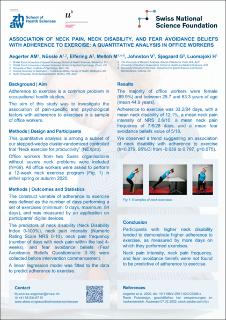Please use this identifier to cite or link to this item:
https://doi.org/10.21256/zhaw-28633| Publication type: | Conference poster |
| Type of review: | Peer review (abstract) |
| Title: | Association of neck pain, neck disability, and fear avoidance beliefs with adherence to exercise : a quantitative analysis in office workers |
| Authors: | Aegerter, Andrea Nüssle, Achim Elfering, Achim Melloh, Markus Johnston, Venerina Sjøgaard, Gisela Luomajoki, Hannu |
| et. al: | No |
| DOI: | 10.21256/zhaw-28633 |
| Conference details: | 18th International Forum for Back and Neck Pain Research in Primary Care, Groningen, The Netherlands, 30 August - 1 September 2023 |
| Issue Date: | 2023 |
| Publisher / Ed. Institution: | ZHAW Zürcher Hochschule für Angewandte Wissenschaften |
| Publisher / Ed. Institution: | Winterthur |
| Language: | English |
| Subjects: | Patient compliance; Musculoskeletal disease; Physical activity |
| Subject (DDC): | 614: Public health and prevention of disease 615.8515: Occupational therapy |
| Abstract: | Background: Adherence to exercise is a common problem in occupational health studies. The aim of this study was to investigate the association of pain-specific and psychological factors with adherence to exercises in a sample of office workers. Methods: This analysis is among a subset of our randomized controlled trial “Neck exercise for productivity” (NEXpro). Office workers from two Swiss organisations without severe neck problems were included (N=69). All office workers were asked to perform a 12-week neck exercise program in either spring or autumn 2020. The construct variable of adherence to exercise was defined as the number of days performing a set of exercises (minimum=0 days, maximum=84 days), and was measured by an application on participants’ digital devices. The predictors of neck disability (Neck Disability Index 0-100%), neck pain intensity (Numeric Rating Scale NRS 0-10), neck pain frequency (number of days with neck pain within the last 4-weeks), and fear avoidance beliefs (Fear Avoidance Beliefs Questionnaire 0-18) were collected before intervention commencement. A linear regression model was fitted to the data to predict adherence to exercise. Results: The majority of office workers were female (69.9%) and between 25.7 and 63.3 years of age (mean 44.9). Adherence to exercise was 33.2/84 days, with a mean neck disability of 12.1%, a mean neck pain intensity of NRS 2.6/10, a mean neck pain frequency of 7.6/28 days, and a mean fear avoidance beliefs value of 5/18. We found weak evidence for an association of neck disability with adherence to exercise (b=0.379, 95%CI from -0.039 to 0.797, p=0.075). Conclusion: Participants with higher neck disability tended to have higher adherence to exercise as measured by more days on which they performed exercises. Neck pain intensity, neck pain frequency, and fear avoidance beliefs were not found to be predictive of adherence to exercise. |
| URI: | https://digitalcollection.zhaw.ch/handle/11475/28633 |
| Fulltext version: | Published version |
| License (according to publishing contract): | Licence according to publishing contract |
| Departement: | School of Health Sciences |
| Organisational Unit: | Institute of Occupational Therapy (IER) Institute of Public Health (IPH) |
| Published as part of the ZHAW project: | Prävention und Intervention von Nackenschmerzen bei Büroangestellten in der Schweiz (NEXpro) |
| Appears in collections: | Publikationen Gesundheit |
Files in This Item:
| File | Description | Size | Format | |
|---|---|---|---|---|
| 2023_Aegerter-etal_Neck-pain-office-workers_lbp-forum-poster.pdf | 469.36 kB | Adobe PDF |  View/Open |
Show full item record
Aegerter, A., Nüssle, A., Elfering, A., Melloh, M., Johnston, V., Sjøgaard, G., & Luomajoki, H. (2023). Association of neck pain, neck disability, and fear avoidance beliefs with adherence to exercise : a quantitative analysis in office workers. 18th International Forum for Back and Neck Pain Research in Primary Care, Groningen, the Netherlands, 30 August - 1 September 2023. https://doi.org/10.21256/zhaw-28633
Aegerter, A. et al. (2023) ‘Association of neck pain, neck disability, and fear avoidance beliefs with adherence to exercise : a quantitative analysis in office workers’, in 18th International Forum for Back and Neck Pain Research in Primary Care, Groningen, The Netherlands, 30 August - 1 September 2023. Winterthur: ZHAW Zürcher Hochschule für Angewandte Wissenschaften. Available at: https://doi.org/10.21256/zhaw-28633.
A. Aegerter et al., “Association of neck pain, neck disability, and fear avoidance beliefs with adherence to exercise : a quantitative analysis in office workers,” in 18th International Forum for Back and Neck Pain Research in Primary Care, Groningen, The Netherlands, 30 August - 1 September 2023, 2023. doi: 10.21256/zhaw-28633.
AEGERTER, Andrea, Achim NÜSSLE, Achim ELFERING, Markus MELLOH, Venerina JOHNSTON, Gisela SJØGAARD und Hannu LUOMAJOKI, 2023. Association of neck pain, neck disability, and fear avoidance beliefs with adherence to exercise : a quantitative analysis in office workers. In: 18th International Forum for Back and Neck Pain Research in Primary Care, Groningen, The Netherlands, 30 August - 1 September 2023. Conference poster. Winterthur: ZHAW Zürcher Hochschule für Angewandte Wissenschaften. 2023
Aegerter, Andrea, Achim Nüssle, Achim Elfering, Markus Melloh, Venerina Johnston, Gisela Sjøgaard, and Hannu Luomajoki. 2023. “Association of Neck Pain, Neck Disability, and Fear Avoidance Beliefs with Adherence to Exercise : A Quantitative Analysis in Office Workers.” Conference poster. In 18th International Forum for Back and Neck Pain Research in Primary Care, Groningen, the Netherlands, 30 August - 1 September 2023. Winterthur: ZHAW Zürcher Hochschule für Angewandte Wissenschaften. https://doi.org/10.21256/zhaw-28633.
Aegerter, Andrea, et al. “Association of Neck Pain, Neck Disability, and Fear Avoidance Beliefs with Adherence to Exercise : A Quantitative Analysis in Office Workers.” 18th International Forum for Back and Neck Pain Research in Primary Care, Groningen, the Netherlands, 30 August - 1 September 2023, ZHAW Zürcher Hochschule für Angewandte Wissenschaften, 2023, https://doi.org/10.21256/zhaw-28633.
Items in DSpace are protected by copyright, with all rights reserved, unless otherwise indicated.